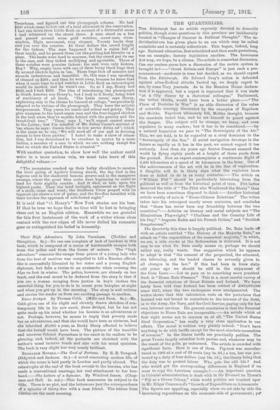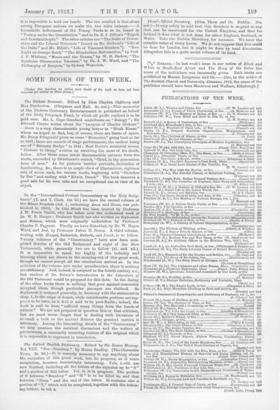THE QUARTERLIES.
Tun Edinburgh, has no article expressly devoted to domestic politics, though some questions in this province are incidentally
treated in "Changes of Current in Political Thought." The in-
dividualist era has given place to an era which may be called socialistic and is certainly collectivist. This began, indeed, long ago. National education, first subsidized and then made gratuitous, was an example ; factory legislation another. The Insurance Act may, we hope, be a climax. The article is somewhat discursive.
Can our readers guess how a discussion of the metric system is brought in P—" Groat Britain and Europe" is just such a pro- nouncement—moderate in tone but decided, as we should expect from the Edinburgh. Sir Edward Grey's action is defended against ultra-Radical attacks backed up, we deeply regret to see, by some Tory journals. As to the Mansion House declara- tion it is approved, but a regret is expressed that it was made "at a City dinner by a rhetorical colleague." Parliament, the writer thinks, would have been a better place.—" The Place of Doctrine in War" is an able discussion of the value of scientific strategy illustrated by the examples of Napoleon and Moltke. Napoleon ultimately fell, Moltke thought, because his marshals failed him, and ho set himself to guard against the danger. The subject will be strange, we fancy, and even repulsive to many readers ; but it has to be considered.—By a natural transition we pass to "The Sovereignty of the Air." This, we are told, is to be regarded as a rival dominion to the "Sovereignty of the Sea." If aerial navigation develops in the future as rapidly as it has in the past, we cannot regard it too seriously. Less than six years ago Santos Dumont amazed the world by flying eighty yards at a height of three yards from the ground. Now an expert contemplates a continuous flight of 2,400 kilometres at a speed of 50 kilometres in the hour. One of the achievements of the art will be in the line of exploration. A dirigible will do in thirty days what the explorers have done or failed to do in as many centuries.—The article on "William Pitt" should be particularly interesting from the political as well as from the historical point of view. Pitt better deserved the title of " The Pilot who Weathered the Storm" than we have been sometimes disposed to think.—Another historical article worthy of note is "Russo-Chinese Relations." The writer takes into his retrospect nearly seven centuries, and concludes that "there has never been any friendship between the two countries."--Artieles on literary and social subjects are "The Elizabethan Playwright," "Chatham and the Country Life of his Day," "Augusta Rodin and his French Critics," and "Scottish Songstresses,"
The Quarterin this time is largely political. Dr. Bate leads off with an article entitled "The History of the Majority Rule," an attack on "the superstition of the numerical majority," in which, we see, a side stroke at the Referendum hi delivered. It is not easy to see what Dr. Bate really means or, perhaps we should rather say, really wants. One suggestion which he appears to adopt is that "the consent of the propertied, the educated, the labouring, and the landed classes be severally given to all changes in the law." If this had been in force sixty. odd years ago we should be still in the enjoyment of the Corn Laws.—Let us pass on to something more practical Such is "Homo Rule Finance." This is a most careful survey of the financial relations of Great Britain and Ireland. We have lately been told that Ireland has been robbed of -8400,000,000 since 1817, when the two exchequers were amalgamated. The writer shows that this calculation rests on the postulates that Ireland was not bound to contribute to the interest of the Debt, or to the Army, the Navy, and the Civil Service, paying only for her own internal services. His general conclusion is that the financial objootions to Home Rule are insuperable.—An article which at first sight seems not to concern us at all, "The United States Steel Corporation," has really a very close application to our affairs. The moral is written very plainly indeed: "Don't have anything to do with tariffs except for the most absolute necessities of revenue." In the States tariffs are practically polities. The great Trusts largely subsidize both parties and, whatever may be the result of the polls, go unharmed. The article is crowded with significant facts. Here is one of them. Pig-iron was manufac- tured in 1900 at a (lost of 82 cents (say 3s. 8d.) a ton, but was pro- tected by a duty of four dollars (say lee. ld.), the theory being that the duty was to protect labour Who gets the odd 125.P And who would get the corresponding differences in England if we wore to copy the American example P—An important question in Colonial administration is dealt with in Sir Everard im Thurn's "Fiji as a Crown Colony," while world politics are touched upor in Mr. Edgar Cmmmond'e "Growth of Expenditure on Armaments The figures are appalling, especially when we set side by side the increasing expenditure on the economic side of government ; yet
it is impossible to hold our hands. The one comfort is that alone among European nations we make the two sides balance.--A formidable indictment of the Young Turks is to be found in " Turkey under the Constitution " and in Dr. E. J. Dillon's "Tripoli and Constantinople." The other articles are "The Duke of Devon- shire and the Liberal Unionists" (based on Mr. Holland's "Life of the Duke" and Mr. Elliot's "Life of Viscount Goat:then"). "New Light on George Sand," "The Elizabethan Reformation," by Prof. J. P. Whitney, "Music and the Drama," by W. IL Hadow, "The Epistolae Obscuroruni Virorum," by Dr. A. W. Ward, and "The Philosophy of Bergson," by Sydney Watorlow.























































 Previous page
Previous page